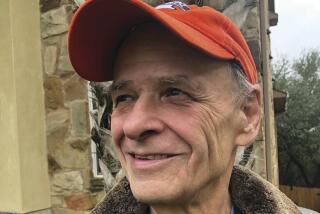Off in search of America
- Share via
The difference between your garden variety obsessive and a dangerous fanatic can be measured in degrees: An obsessive develops an appreciation for a particular concern or hobby and devotes a decent portion of life to exploring the margins of this attachment. A fanatic, however, begins to embody the obsession until it becomes some sort of personal definition. Absolute devotion to anything that cannot return the emotion can devolve into disaster. It’s the world of the chroniclers of this world that veteran screenwriter and journalist Charlie Haas dives into with his funny and often moving, if ultimately transient, debut novel, “The Enthusiast.”
Narrator Henry Bay leaves college -- and a law school future -- in search of freedom from a kind of suburban ennui caused by familial pressures, namely to avenge the corporate raking his father suffered (which drove pere to a job working at a salad bar) and the unbridled genius of his scientist brother Barney. He finds work in a series of magazines, the mere titles of which suggest a life without adult responsibility, including Kite Buggy, Crochet Life, Spelunk and Cozy, the Magazine of Tea, in cities distant and forgettable.
And yet Bay finds that these small towns and magazines offer a romance of their own, particularly tiny Clayton, Ill., which had “taken its time being built, and was fading gradually now instead of crashing all at once.” Corporate home of Dobey Publications, Clayton was a world that Bay felt he’d been “born missing,” while the work itself gave him his own America, where each stop along the way became a “huge room lined with doors. Behind each door was an enthusiasm.”
Haas paints Bay as the eternal searcher, though what he’s searching for is never entirely clear. Anyone who spends their life on the road looking for America eventually runs the risk of turning into a Simon and Garfunkel lyric, muttering in the darkness that they are lost and empty and aching, because how do you find what is already there?
In a novel in which transience isn’t merely a theme but a personality trait, this continual searching leads to a series of chapters featuring odd (though never exactly lunatic) enclaves of fandom and obsession. The book is frequently funny and ironic, and Haas treats each of these covens with a yearning devotional respect. If only he had given Bay a similar fidelity, perhaps the novel would find an even greater meaning. That’s not to say the book is a trifle, only that there is soil to be tilled here that is often left untouched.
At some point even a subculture becomes its own polluted eco-system, so as Bay grows up on the page -- from freelancer to associate editor to corporate fixer for a number of bizarre magazines -- his world expands and then contracts, until what was a lark initially becomes a life.
Upon his spur-of-the-moment marriage to Patti, a talent wrangler for a skateboard company, followed by a move to Silicon Valley, it becomes evident that while Haas’ intentions with his novel are mainly comic, there is a sadness that prevails. What is this existence if not a series of enthusiasms that eventually become the mundane? Who are we without adrenaline?
Where “The Enthusiast” stumbles is in its quest for importance via a Unabomber-like character known as Freebird, a violent extremist who shadows the story through the various cultures Bay visits and, most directly, in the world inhabited by Barney, a stem-cell researcher. This aspect of the novel feels misplaced, particularly since Haas already gives import to this world. There is an inevitability to the Freebird subplot that doesn’t exactly produce tension as much as it exists as an engine of supposition, forcing the reader to wonder whether each anthropologically correct oddball Bay meets along his travels is really a domestic terrorist.
“The Enthusiast” finally isn’t just about thrill-seekers and obsessive fandom as much as it is about root systems and beliefs. Heady stuff for a comic novel, but once you settle inside your America, as Henry Bay does, eventually you end up trying to find a home and a fundamental bedrock, both literal and metaphorical. Maybe you hold on to competitive knitting or underwater curling or professional log-rolling, or perhaps you just catalog those things, and maybe, if you’re lucky, you find other people who love to do the very same thing.
More to Read
Sign up for our Book Club newsletter
Get the latest news, events and more from the Los Angeles Times Book Club, and help us get L.A. reading and talking.
You may occasionally receive promotional content from the Los Angeles Times.









